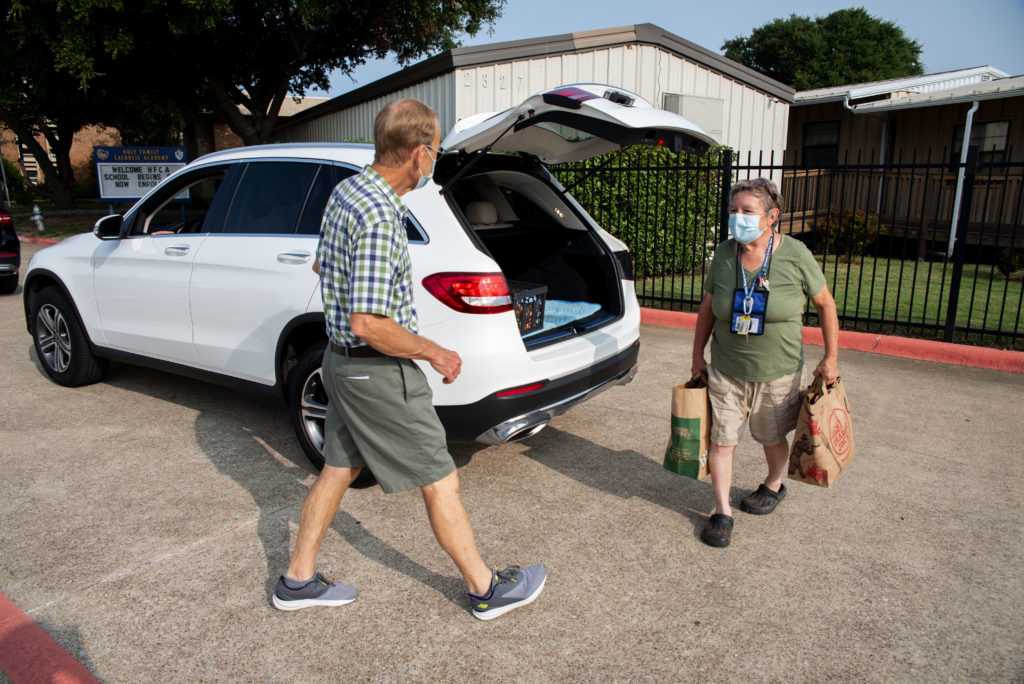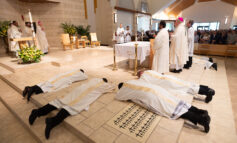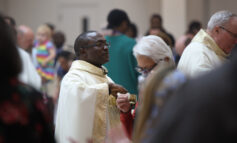
Volunteer Mary Hart helps unload food donations from cars at Holy Family of Nazareth Catholic Church in Irving for the Society of St. Vincent de Paul food pantry, which has operated at the parish for five years. (JENNA TETER/Special Contributor)
By Father Jacob Dankasa
Special to The Texas Catholic
As Christians, we believe in the four last things: death, judgment, heaven and hell. As Catholics we also believe in a place of reparation called purgatory. We strive to live good Christian lives on earth because we love God and desire heaven as our ultimate end. Our scriptures tell us that when our sojourn on earth is ended, we shall be judged according to our deeds. Christ teaches about the Last Judgment and uses parables to present us with its reality. One major theme in Christ’s teaching about judgment is the need for preparation — a preparation that takes place while we are still here on earth.
One of the teachings of Christ about judgment is presented in his parable of the sheep and the goats (Matthew 25:31-46). This teaching is called The Judgment of the Nations:
“When the Son of Man comes in his glory, and all the angels with him, he will sit upon his glorious throne, and all the nations will be assembled before him. And he will separate them one from another, as a shepherd separates the sheep from the goats. He will place the sheep on his right and the goats on his left. Then the king will say to those on his right, ‘Come, you who are blessed by my Father. Inherit the kingdom prepared for you from the foundation of the world. For I was hungry and you gave me food… ‘Amen, I say to you, whatever you did for one of these least brothers of mine, you did for me.’…”
I find this parable remarkably interesting for its emphasis on community. Christ places himself at the center of this community and equates relationship with one another within the community to relationship with him: “whatever you did for one of these least brothers of mine, you did for me.”
In presenting this vision of the judgment, Christ presents us with an image of two different types of communities: the community of the sheep on the right and the community of the goats on the left. Jesus identifies the sheep on the right as “blessed by my Father.” This is the community where Christ feels welcomed and recognized. This is simply a community where humans care for humans and, by that very act, care for Jesus himself: “for I was hungry and you gave me food, I was thirsty and you gave me drink….”
Jesus demonstrates to us that he feels more at home in a community where humans can see human needs, identify them and act to render help. Those whom Jesus refers to in this passage of the Gospel as “blessed by my Father” had no idea that they were doing anything for Jesus: “Lord, when did we see you hungry and feed you?” (Matt. 25:37) They did good deeds because they felt the need to help humanity. These are the types of human actions that gain us a place at the right hand of God, like the sheep in the parable.
On the other hand, we need to fight against belonging to the community of the goats as described in the Gospel. Those in this community also asked: “Lord, when did we see you hungry or thirsty… and not minister to your needs?” (Matt. 25: 44) And Jesus answered, “what you did not do for one of these least ones, you did not do for me.”
The problem with those of us in this group is not that we do not love Jesus; apparently we do, and we would love to help Jesus. But we fail to see him when he comes to us through others, the very people we live with. We may simply say to people who come to us seeking help, “I’ll pray for you.” We say this even when we have the means to assist them in a more concrete way. Prayer is very important, but it’s not sufficient — especially if we have the ability to alleviate the suffering of our brothers and sisters in need. We need to do both — pray and act. The gift of presence, a smile, words of compassion, or reaching out with our resources – these are some of the ways we can take action to care for one another.
In this scriptural passage, Jesus invites us to strive to belong to a community where the needs of a neighbor are not ignored. In such a community, humans don’t just tell fellow humans, “Go — God will take care of you.” Rather, humans take the place of God, acting on his behalf towards those in need. We are invited to act where we see a need. Doing nothing when we have the means to assist is a failure in our Christian responsibilities. As Christians, we’re not only to desire to meet the religious needs of our people. We are also called to meet their human needs. In meeting their human needs, we introduce religious fulfillment to the needy. Human needs are found in the hungry, the prisoner, the sick, your spouse, your friend, a neighbor. We must learn to be attentive to the needs of those around us. Any little act of kindness brings with it a divine blessing and the reward of being called “blessed by my Father.”
Our giving should be heartfelt. It should be carried out not merely out of a sense of duty, and not because of any anticipated reward — not even reward from God. It should be done with the primary intention of helping to fulfill an identified human need, of serving Christ Himself in those in need.
Father Jacob Dankasa is the parochial vicar at St. Gabriel the Archangel Catholic Church in McKinney.



